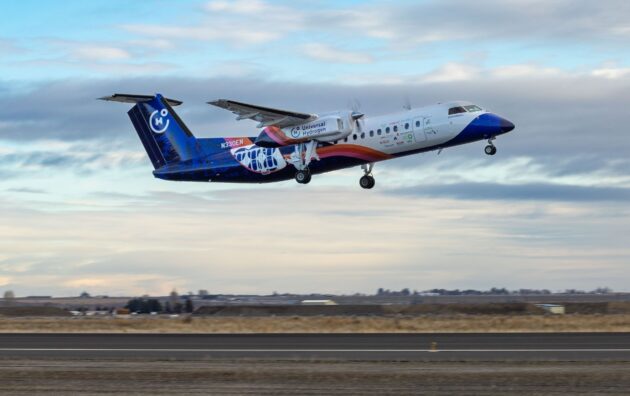
California-based Universal Hydrogen — which put a hybrid prototype for a hydrogen-fueled airplane into the air last year in Moses Lake, Wash. — has run out of money and is shutting down operations, The Seattle Times reported today.
The Seattle Times cited a letter sent to shareholders on Thursday by Mark Cousin, the startup’s chairman and CEO. Cousin’s letter said the company’s executives were “unable to secure sufficient equity or debt financing to continue operations and similarly were unable to secure an actionable offer for a sale of the business or similar strategic exit transaction,” according to the newspaper.
We have reached out to Universal Hydrogen for comment and will update this report with anything we can pass along.
Universal Hydrogen made its mark in March 2023 when it flew a modified De Havilland Dash 8-300 turboprop with a hydrogen-fueled electric propulsion system mounted on the plane’s right wing. The system incorporated a megawatt-class motor built by Everett, Wash.-based MagniX. The engine on the left side was left unconverted to serve as a backup.
Less than four months after that initial flight, Universal Hydrogen relocated its test program from Moses Lake to the Mojave Air and Space Port in California. In February, the company announced a successful on-the-ground test of its hydrogen storage module and fuel-cell powertrain — and said it planned to have the system used in passenger airplanes by 2026.
Universal Hydrogen’s shutdown would serve as one more sign that if hydrogen is to become a widely used energy option, it’s likely to take longer than its proponents had hoped.
The Seattle Times quoted Paul Eremenko — who co-founded Universal Hydrogen in 2020 but left the company in April to help create a stealthy AI startup — as saying that private equity firms have become less bullish about Universal Hydrogen’s business plan due to higher interest rates, fears of an impending recession and the prospect of a second Trump administration in the White House. (The Biden administration has been a strong supporter of hydrogen fuel options.)
For what it’s worth, MagniX announced plans to begin building hydrogen fuel cells for aviation applications in 2022, but today the company is instead keeping its focus on electric powertrains and advanced batteries.
Seattle-based First Mode provided another example of the downturn in enthusiasm for hydrogen in January when it announced a round of layoffs and changed its short-term business plan. The company previously focused on building hydrogen-fueled powertrains for heavy trucks, but now it’s putting more emphasis on hybrid diesel-battery powertrains.
Meanwhile, California-based ZeroAvia is staying the course with its plan to build hydrogen-electric powertrains for airplanes. In April, the company hosted a ribbon-cutting ceremony for a 136,000-square-foot manufacturing facility in Everett and announced that it would sell propulsion system components to other companies. Seattle-based Alaska Airlines is one of ZeroAvia’s strategic partners — and one of its investors as well. Microsoft co-founder Bill Gates’ Breakthrough Energy Ventures and Amazon’s Climate Pledge Fund are also investing in ZeroAvia.




